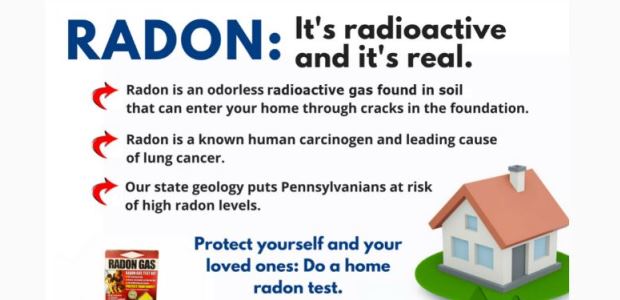
Pennsylvania Agency Urges Residents to Test for Radon
EPA has set 4 picocuries of radon per liter (pCi/L) of air as an Action Level. For anyone who has a higher radon level than this, EPA, DEP, and the U.S. surgeon general recommend having a radon mitigation system professionally installed to lower it by venting radon to the outside.
Pennsylvania's Department of Environmental Protection urged state residents Jan. 2 to start off the new year by testing their homes for radon, a naturally occurring radioactive gas that is the second-leading cause of lung cancer. Winter is a good time to test in Pennsylvania because doors and windows are closed, providing more accurate results.
January is National Radon Action Month.
"Because of our geology, nearly every county in the commonwealth has locations of high radon levels, putting Pennsylvanians at risk of exposure," said DEP Secretary Patrick McDonnell. "A radon test is a great way to protect yourself and your family. Fortunately, testing your home for radon is as simple as opening a can, and inexpensive do-it-yourself tests are available at hardware and home stores."
"Radon is a leading cause of lung cancer in Pennsylvania," Health Secretary Dr. Rachel Levine said. "Since we know that radon is prevalent in homes across Pennsylvania, it is important to test your home. It is a simple step you can take to protect your family's health."
Radon is an odorless, colorless, radioactive gas that occurs from the breakdown of uranium in the ground. It enters homes through cracks in the foundation or other openings. High levels of radon tend to be found in basements, but the gas can be found anywhere in a home.
EPA has set 4 picocuries of radon per liter (pCi/L) of air as an Action Level. For anyone who has a higher radon level than this, EPA, DEP, and the U.S. surgeon general recommend having a radon mitigation system professionally installed to lower it by venting radon to the outside.
Radon testers, mitigators, and laboratories in Pennsylvania must be certified by DEP, which provides a public list of certified radon service providers. The state agency will send free follow-up test kits to Pennsylvanians who've tested their homes and have results higher than 100 pCi/L or who've installed an active mitigation system during the past year.
For people buying or selling a home, Pennsylvania's Real Estate Seller Disclosure Act requires sellers to disclose the results of any known radon testing.